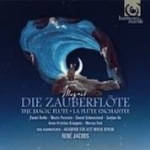Insightful, energetic leadership, just-about-perfect playing from the orchestra and singing from the chorus, lively delivery of the dialogue, well-characterized performances of every musical number, entertaining extraneous noises (bird tweets, animal sounds, thunder, etc.), generous use of appoggiaturas and embellishments, and a great, trill-filled cadenza for the Three Ladies at the close of their first number–what is there to criticize about this new, highly theatrical Zauberflöte, the latest in René Jacobs’ complete Mozart opera edition?
Well, I’ll tell you. Granted, this Singspiel was the composer’s biggest commercial success. Emanuel Schikaneder, who ran the theatre, sang Papageno and also wrote the libretto, carefully stressing both the mundane and the spiritual, so that Masons and regular Joes could enjoy the work equally. The Viennese loved it: it was chatty and witty, and Mozart’s music, both in serious or comic moments, was both sophisticated and approachable (as only he can be). It was a wonderful evening at the theatre. And for most, the dialogue brought it down to earth and it became middle-brow, Mozart or not.
In this production Jacobs has restored every line of Schikaneder’s dialogue. Despite quick tempos, the performance comes in at 10 minutes short of three hours. There is seven minutes of dialogue between “Der Vogelfäder…” and “Dies Bildnis” and another six before “Bei Männern”, made no less tedious by the pianoforte’s replaying of the “Bildnis” aria under Papageno’s and Pamina’s conversation. And there are another dozen non-musical stretches, each averaging close to three minutes. If you don’t speak German, and don’t find Schikaneder’s text particularly riveting (which you won’t, particularly after the first hearing, even if you do speak German), you will find yourself pressing the fast-forward button–which sometimes fools you because aria and text are on the same track.
My very first recording of this opera was led by Otto Klemperer and omitted all of the dialogue; heresy or not, I loved it. Nowadays, on stage, or even at home, a bit of dialogue helps clarify and can be very engaging. Yet, although it is delivered here with the greatest theatrical flair, it’s boring and infuriating.
Enough about that. Tempos are odd and change within numbers: the early scene in which slaves react to Papageno’s bells features a strange push and pull–and it works. However, the first entry of the Three Boys, in which they extol patience, is so fast that it loses all effect. “Ach ich fühls” is sped through in three minutes; it is robbed of both pathos and beauty. Sarastro’s music also is sung fast, depriving it of gravitas.
I get it–Jacobs is returning this work to his notion of what he thinks Mozart and Schikaneder presented to their audiences. He explains it diligently in the 315-page booklet that accompanies the three CDs. I neither know nor care if he is right. Some of the musical moments thrill; others, usually the moving ones, feel misunderstood or neglected. And please recall that I am among Jacobs’ greatest admirers and would not do without his Clemenza, Cosi, Idomeneo, etc.
As with all of Jacobs’ Mozart recordings, the pianoforte is used prominently–to comment, embellish, wink, and underpin even when the full orchestra is playing. It fascinates and enlightens about half of the time; it otherwise feels intrusive and occasionally is reminiscent of silent-movie music.
The singing is uniformly excellent, with predominantly light voices. Daniel Behle and Marlis Petersen are lovely young Royals, with Petersen’s Pamina a particular delight; Anna-Kristiina Kaappola’s Queen is staggeringly accurate, with the staccato high notes sung, as Jacobs explains in his notes, on the correct, angrier-sounding vowel (bringing “micro-managing” to a new high); Marcos Fink’s Sarastro is lighter and less imposing than most, but still handsomely sung. The unfortunately-named Daniel Schmutzhard is a very likeable Papageno, and Sunhae Im matches his charm as Papagena. The Three Ladies are terrific, as are the Three Boys. As mentioned above, the Akademie für Alte Musik Berlin plays as well or better than any period-instrument band in the world.
I realize it seems as if I do not like this performance, but all other things being equal, Jacobs (as usual) has enough musical ideas to keep our interest and to make us sit up at times and feel renewed. But then there are those other times–and the dialogue. Fast-forward button at the ready, with patience for some intense self-indulgence, and you’ll be fascinated by this performance. Whether that fascination outweighs your irritation is another issue.
































